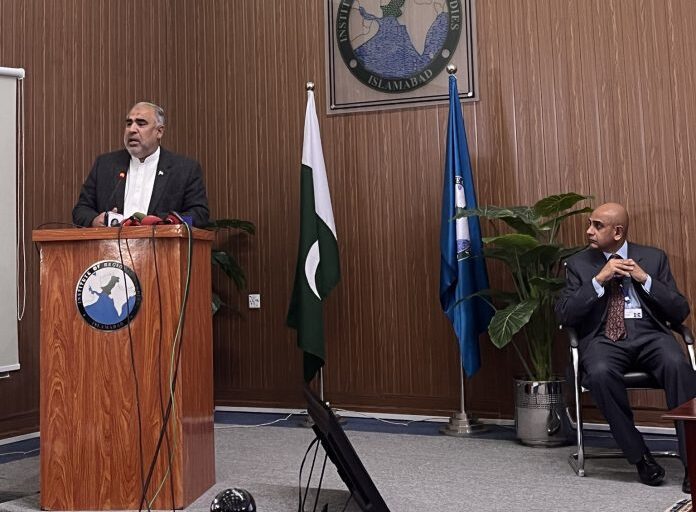News Desk
ISLAMABAD, February 23, 2022: Commenting on Prime Minister Imran Khan’s visit to Russia, Speaker of the National Assembly Mr Asad Qaiser stated that Pakistan aspires to have cordial relations with all the countries of the world based on its national interest. He was speaking at the inaugural session of the two-day international conference titled “South Asia: Emerging Opportunities and Challenges” organized by the Institute of Regional Studies (IRS) in collaboration with Friedrich Ebert Stiftung (FES) here on Wednesday.
The Speaker of the National Assembly lauded Pakistan’s exemplary relations with China, but expressed his concern over the deteriorating relations with India owing to Indian actions in the Indian Illegally Occupied Jammu and Kashmir (IIOJK). Mr Qaiser highlighted the important role played by think-tanks in informing policy decisions.
In a written message sent to conference organizers, Foreign Minister Shah Mehmood Qureshi urged the regional countries and the international community to synergize their efforts to stabilize Afghanistan as well as work towards unlocking the true potential of the over 1.7 billion, mostly young, population of South Asia.
The Federal Minister for Human Rights Dr Shireen Mazari highlighted the achievements of her ministry in ensuring basic human rights for the citizens of Pakistan. She added that Pakistan took a human rights-based approach towards the Covid-19 pandemic by looking after the interests of all segments of the society. She was of the view that in many priority human rights areas, Pakistan had done better than other regional countries. She regretted the increasing polarization, extremism, and Islamophobia in India.
President IRS Ambassador Nadeem Riyaz urged the participants of the conference to focus on tapping into the immense potential of the region by finding ways to surmount regional conflicts, overcome domestic pressures of poverty, inequality, and extremist ideologies, respond to contemporary global challenges, and find ways to collectively engage in bringing prosperity to everyone.
Mr Syed Hassan Akbar, Senior Policy Specialist at the National Security Division, expressed his concern over the increasing global competition and its impact on the region. He referred to conflicts in South Asia as a legacy of the colonial system which, according to him, were exacerbated by global power competition. He added that Pakistan’s priority was to address the humanitarian crisis in Afghanistan and assist the country in achieving political stability. Mr Akbar said that while Pakistan was ready to engage with India, it was up to India to create an enabling environment for talks.
Professor Swaran Singh of the Jawaharlal Nehru University, India, stated that New Delhi aspired to reach out to the people of Afghanistan. This, he maintained, was the reason India was sending a large consignment of wheat to Afghanistan through Pakistan. He added that such cooperation between India, Afghanistan, and Pakistan could create opportunities for breaking the ice between India and Pakistan as well.
Pakistan’s former ambassador to the US Dr Maleeha Lodhi expressed her regret that the thaw in India-Pakistan relations with the recommitment to observing the ceasefire along the Line of Control could not lead to a broader dialogue between the two countries and ultimately normalization of relations. She listed several steps taken by the Indian government in the recent past which, according to her, were inimical to peace in the region.
Former adviser to the Prime Minister on institutional reforms and austerity Dr Ishrat Hussain shared that South Asia was still home to 400 million people living below $1.9 per day which, according to him, was the largest concentration of poor in the world. He expressed his regret over South Asia being the least economically integrated region of the world. He shared that intra-region trade in South Asia was only 5 per cent compared to 40-45 per cent in Southeast Asia. Dr Hussain urged New Delhi to assume the role of a benevolent leader shouldering disproportionate responsibility to take the region to prosperity.
The World Bank’s Country Director in Pakistan Mr Najy Benhassine shared that in the past 20 years the share of the population in Pakistan below the poverty line has reduced from 64 per cent to 21 per cent. This, he shared, translated into 47 million Pakistanis emerging out of poverty in 20 years. He added that Pakistan achieved this remarkable success in reducing poverty despite its average economic growth as compared to its peers in the same period. This, according to him, proved that Pakistan had done well to transform its relatively low growth rate into a significant reduction in poverty. He cautioned, however, that this momentum in reducing poverty could be lost because of Covid-19 and climatic changes.
Sri Lankan academic and geopolitical analyst Dr Asanga Abeyagoonasekera urged the US government to avoid viewing its relations with the countries of South Asia through the lens of its competition with China. Such an approach, he argued, could further complicate the US relations with regional countries.
Meritorious Professor at the Karachi University Dr Moonis Ahmar listed six steps for countering extremism, including establishment of rule of law, focus on health and education of the youth, addressing the sense of deprivation among certain segments of the society, strengthening state institutions, enhancing regional civil society cooperation, and responsible media.
Other notable speakers at the conference were Pakistan’s former foreign secretary Ambassador Inam-ul-Haque, Pakistan’s former ambassador to India Ambassador Riaz Khokhar, and Dr Zahid Shahab Ahmed of the Deakin University Australia.
